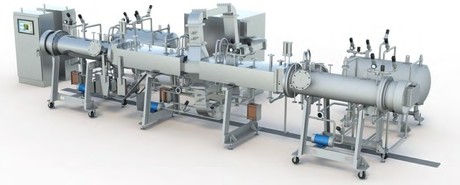Amazon to sell ready meals with a 12-month shelf life and no need for refrigeration

Muscling further into the grocery and ready meals markets, it is being reported that Amazon will be using new technology to create ready meals that have a shelf life of 12 months and do not need to be refrigerated. The logistics savings alone will be huge. Not only that, the meals are nutritious, taste good, require minimal processing and have clean labels.
The microwave assisted thermal sterilisation, or MATS, technology, originally developed by Washington State University, is being commercialised by US start-up 915 Labs. The patented, FDA-accepted technology is very different from conventional processing systems such as retort, where food is exposed to high temperatures for up to an hour; HPP, which has limited product scope and requires refrigeration; and frozen, which is plagued by food safety, consumer inconvenience and sustainability issues.
In MATS, packaged foods are simultaneously immersed in pressurised hot water and heated with targeted microwave energy at a frequency of 915 MHz, eliminating pathogens and spoilage microorganisms in a matter of minutes. The unique process allows a wide range of foods to be packaged for the shelf, including many that cannot be conventionally processed today including salmon fillets, chicken breasts, pasta and whole vegetables.
By reducing exposure to high heat, MATS allows the natural nutrients and flavours in food to remain intact — and eliminates the need for artificial additives, preservatives and excess sodium.
915 Labs is now building MATS-30 commercial production systems capable of processing up to 10 million units annually, including single-serve trays, pouches and foodservice packaging formats.
The MATS-30 complements the company’s small-scale MATS-B systems, which are operating in food innovation centres around the world.
Australian Defence has been an early adopter MATS
Last October, the Australian government announced a $7.2 million investment into improving food processing technology using the microwave processing systems sold by 915 Labs, beginning with a pilot-scale plant to be placed in the Defence Food and Nutrition Centre in Scottsdale, Tasmania.
“Microwave food processing can revolutionise the quality of packaged food,” said Prof Roger Stanley, director of the Centre for Food Innovation at the University of Tasmania. “The technology gives us the ability to deliver food that is much closer to fresh.”
MATS and microwave assisted pasteurisation systems manufactured and sold by 915 Labs offer a faster way to sterilise or pasteurise food and beverages. By shortening the time food is exposed to high heat, the microwave technology can preserve nutrients, texture and taste and eliminate the need for additives and additional sodium.
“Microwave sterilised meals have the potential to improve the production and quality of ready-made foods across both Defence rations and the wider commercial market, both nationally and within the Asia-Pacific region,” said Australia’s Senator Marise Payne, Minister for Defence, when announcing the investment.
The Australian investment in MATS followed a feasibility study undertaken by the Defence Science and Technology (DST) Group in cooperation with Australian industry and the Centre for Food Innovation, a collaboration of DST Group, the University of Tasmania and Commonwealth Scientific and Industrial Research Organization (CSIRO).
The Australian government plans to use the pilot-scale MATS system to develop new and improved ration packs for its Defence forces. The government will also make the MATS pilot-scale machine available to food companies for product development and experimentation.
“It makes sense for the military and industry to work together because it is important to establish an industry base for the new technology before Defence can make use of it,” said Coad. “Our investment de-risks the capital investment for industry and gives food companies the opportunity to explore the opportunities offered by MATS.”
“By giving small to medium-size companies access to this innovation, we can help the regional hospitality and institutional food industries and improve the quality of emergency disaster relief rations,” Prof. Stanley added.
In addition to the Australian sale, 915 Labs has sold MATS systems in the US, India, Singapore and South Korea.
What's new on the shelf
From classic reinspired ice cream to West African flavours in a jar and whiskey aged in a gaol,...
What's new: six on the shelf
From classic chocolatey flavours reinspired to Korean delicacies, have a look at what's new...
What's new on the shelf?
From Aussie/American fusion-inspired hot sauce to a canned protein drink for gamers, have a look...














